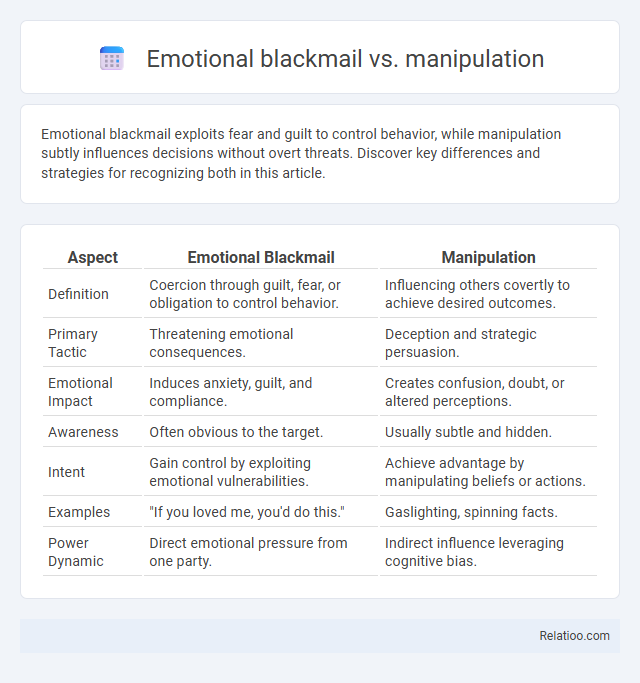Emotional blackmail exploits fear and guilt to control behavior, while manipulation subtly influences decisions without overt threats. Discover key differences and strategies for recognizing both in this article.
Table of Comparison
| Aspect | Emotional Blackmail | Manipulation |
|---|---|---|
| Definition | Coercion through guilt, fear, or obligation to control behavior. | Influencing others covertly to achieve desired outcomes. |
| Primary Tactic | Threatening emotional consequences. | Deception and strategic persuasion. |
| Emotional Impact | Induces anxiety, guilt, and compliance. | Creates confusion, doubt, or altered perceptions. |
| Awareness | Often obvious to the target. | Usually subtle and hidden. |
| Intent | Gain control by exploiting emotional vulnerabilities. | Achieve advantage by manipulating beliefs or actions. |
| Examples | "If you loved me, you'd do this." | Gaslighting, spinning facts. |
| Power Dynamic | Direct emotional pressure from one party. | Indirect influence leveraging cognitive bias. |
Understanding Emotional Blackmail: A Clear Definition
Emotional blackmail is a form of psychological manipulation where one person uses fear, guilt, or obligation to control another's behavior, exploiting emotional vulnerabilities. Unlike general manipulation, which may involve subtle tactics or deceit, emotional blackmail explicitly threatens negative consequences to coerce compliance. Understanding emotional blackmail requires recognizing patterns of threat, guilt induction, and pressure designed to override personal autonomy and provoke a desired response.
Defining Manipulation: Subtle Tactics Unveiled
Manipulation involves covert techniques designed to influence others' behavior or emotions without their awareness, often by exploiting vulnerabilities or creating dependencies. Unlike overt emotional blackmail, which explicitly threatens or pressures for compliance, manipulation uses subtle tactics such as guilt-tripping, gaslighting, or selective information sharing to achieve control. Understanding these nuanced strategies reveals how manipulation operates beneath the surface to shape decisions and relationships silently.
Emotional Blackmail vs Manipulation: Key Differences
Emotional blackmail involves using fear, guilt, or obligation to control someone's behavior, often through explicit threats or demands, whereas manipulation subtly influences emotions to achieve the manipulator's goals without overt pressure. Emotional blackmail is direct and coercive, relying on the victim's emotional vulnerabilities, while manipulation employs more indirect tactics such as guilt-tripping, gaslighting, or deception. Understanding these distinctions is crucial for identifying abusive dynamics and protecting oneself from emotional exploitation.
Signs You’re Experiencing Emotional Blackmail
Emotional blackmail involves using fear, obligation, and guilt to control others, with common signs including persistent threats, excessive guilt-tripping, and withholding affection to manipulate behavior. Manipulation generally encompasses a broader range of deceptive tactics aimed at influencing others covertly, whereas emotional blackmail specifically relies on exploiting emotional vulnerabilities. Identifying emotional blackmail requires recognizing patterns such as feeling trapped, constant anxiety over pleasing someone, and confusion due to contradictory demands.
Common Manipulation Techniques and Examples
Emotional blackmail involves exploiting fear, guilt, or obligation to control someone's behavior, often using threats or withdrawal of love as leverage. Manipulation employs tactics like gaslighting, passive-aggressiveness, and guilt-tripping to influence or deceive others subtly, often distorting reality to confuse or undermine the target. Common examples include making others feel responsible for the manipulator's feelings, exaggerating consequences to force compliance, and withholding affection to punish or coerce.
Psychological Motivations: Why People Engage in Emotional Blackmail
Emotional blackmail is driven by a desire for control and power, where individuals exploit others' fears and vulnerabilities to achieve compliance. Manipulation broadly involves influencing others' behavior for personal gain, often through deceptive or exploitative tactics, but emotional blackmail specifically targets emotional bonds using threats or guilt. The psychological motivation behind emotional blackmail includes insecurity, fear of abandonment, and a need to maintain dominance within relationships or social dynamics.
Emotional Consequences: Impact on Victims
Emotional blackmail inflicts deep psychological distress by exploiting Your fears and guilt, often leading to anxiety, low self-esteem, and emotional exhaustion. Manipulation subtly undermines victims' confidence and autonomy, causing confusion and long-term trust issues without overt threats. Both tactics create lasting emotional scars, but emotional blackmail uniquely instills a persistent sense of powerlessness and fear of reprisal.
How to Respond to Emotional Blackmail
Responding to emotional blackmail requires setting clear boundaries and recognizing manipulative tactics such as guilt-tripping, threats, or excessive pressure designed to control your decisions. Your best defense is assertive communication that acknowledges the manipulator's attempt while firmly refusing to comply with unreasonable demands. Seeking support from trusted individuals or professional counselors can empower you to maintain emotional autonomy and prevent recurring exploitation.
Setting Boundaries to Counteract Manipulation
Setting boundaries is essential to counteract emotional blackmail and manipulation, enabling you to protect your emotional well-being and assert control over interactions. Clear, consistent limits signal that your feelings and needs are valid, reducing the manipulator's power to exploit guilt, fear, or obligation. Empower yourself by recognizing tactics such as guilt-tripping or deceit and responding firmly with non-negotiable boundaries to maintain healthy relationships.
Seeking Help: Recovery and Support Resources
Recognizing the distinct tactics of emotional blackmail and manipulation is crucial for Your healing journey, as both can deeply impact mental well-being. Seeking help from licensed therapists, support groups, and trusted friends provides essential recovery resources tailored to address these psychological abuses. Accessing specialized support services enhances resilience, promotes emotional clarity, and fosters long-term personal empowerment.

Infographic: Emotional blackmail vs Manipulation
 relatioo.com
relatioo.com